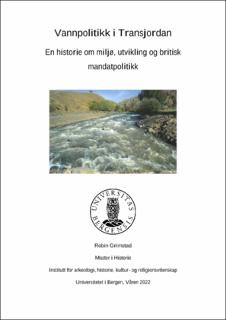Vannpolitikk i Transjordan
Master thesis
Permanent lenke
https://hdl.handle.net/11250/2999391Utgivelsesdato
2022-05-20Metadata
Vis full innførselSamlinger
- Master theses [240]
Sammendrag
The role of water politics in the Transjordan region as played by the British is a matter of particular interest, impacted by several factors. As the control of water has served as a fundamental issue in state development throughout history, it warrants research into its effect on the history of Transjordan. The Jordan River and the Dead Sea, being the region’s major resources of surface water, additionally share borders with Palestine, so examination of the relevant mandates in relation to both the states allows for closer investigation of this historical development; indeed, the policies and the political climate of Palestine often interfered and impacted the British water politics in Transjordan. Both the Jewish and British described their perception of the land in both of the mandates as “unproductive” and that it was necessary to “return the land to cultivation.” The developmental absence in Transjordan garnered interest from Jewish entrepreneurs and organizations who saw the cultivatable zone of Transjordan as potential for future Jewish settlements. Study of the source material indicates that the Jewish economy was initially favored by the British High Commissioner of Palestine and Transjordan, who gave the rights to the Jordan and Yarmuk River and the Dead Sea to two Jewish entrepreneurs. Support for this indication is also demonstrated by the manner in which antimalarial work in Palestine connected to its economic development. In Transjordan however, antimalarial work was not such a contributor to the region’s progress. The highly limited economy and sole dependence on their Palestinian budget did not provide for engagement in large-scale land reclamation for Transjordan. By the early 1930s however, the British no longer favored the Jewish economy as tensions in Palestine gave rise to anti-Jewish tendencies, spreading throughout the Transjordanian population. British officials therefore took initiative to apply to the Colonial Development Fund for aid towards water and irrigation projects for cultivation and the improvement of the nomadic economy. After the Palestine Potash Limited applied for water use from the Wadi Hasa River in Transjordan in the late 30s, the British officials in Transjordan favored development of the country and maintaining the legal rights of the cultivators, over supporting the Jewish economy. High political tension led to prioritization of the water rights of the cultivators. Such retraction of favoritism for the Jewish economy when the mandate security was at risk is indicative of the ad hoc pattern of British politics in Transjordan.
